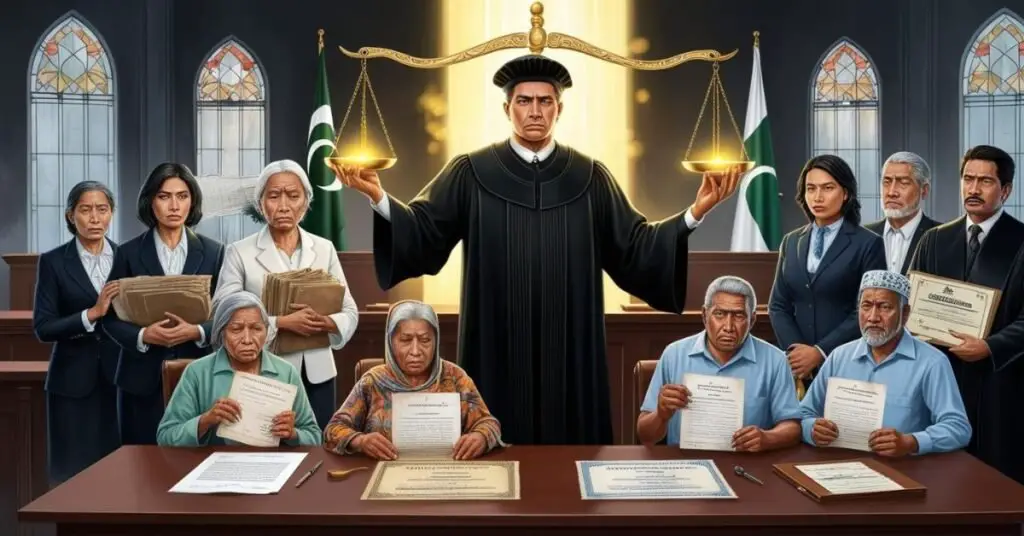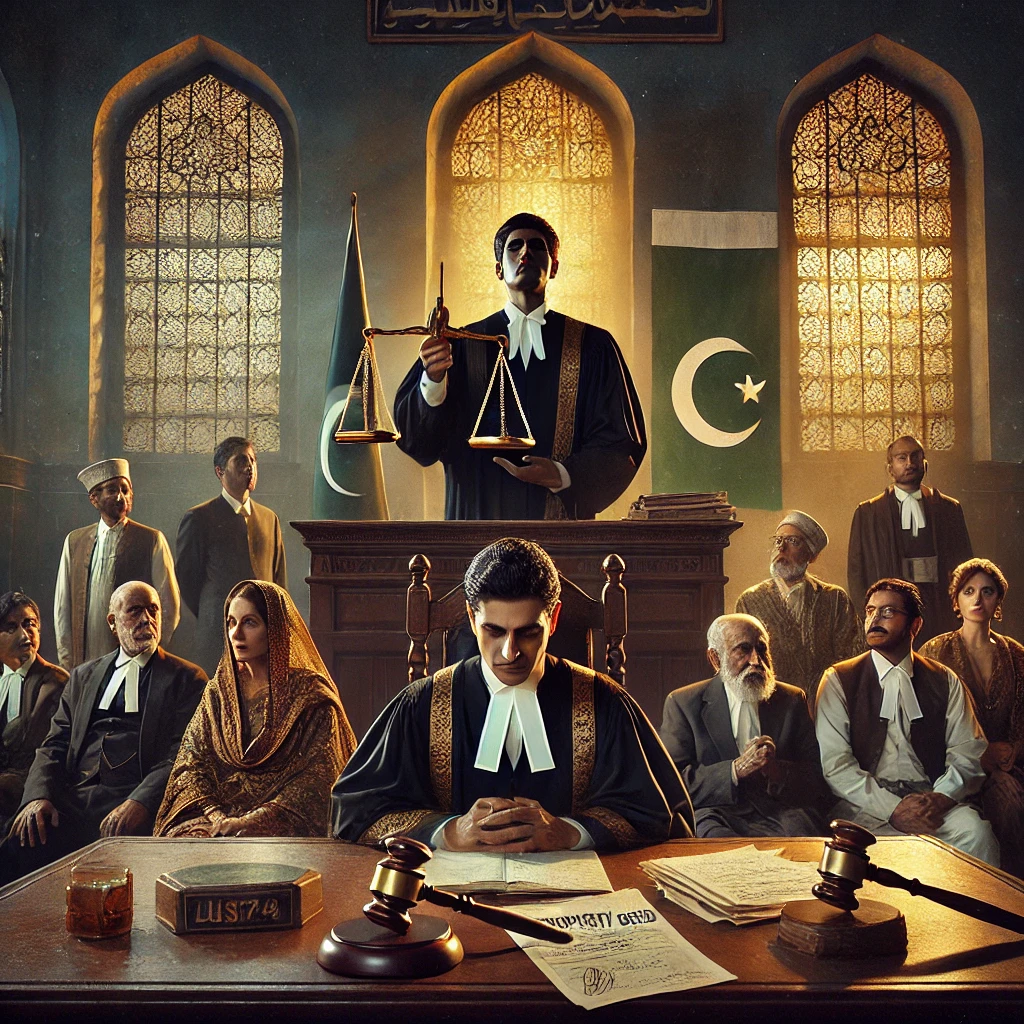Inheritance Wars: How Pakistan’s Courts Use Evidence to Deliver Justice
Journey of Justice: A Review of Inheritance Rights and Legal Complexities
In Pakistani society, issues surrounding inheritance rights and property disputes have always been complex. People often hesitate to pursue legal avenues to claim their rights, fearing that courts may not rule in their favor. However, the legal system is fundamentally rooted in justice and principles, providing every citizen the opportunity to seek redress through the courts.
In this article, we examine a case involving a disputed inheritance, presenting arguments from both parties, key legal points, and the court’s verdict in simple terms. This analysis aims to demystify how courts uphold the law and justice, and why citizens should confidently approach the judiciary to protect their rights.
انصاف کا سفر: وراثتی حقوق اور قانون کی پیچیدگیوں کا جائزہ
پاکستانی معاشرے میں وراثتی جائیداد اور حقوق کے مسائل ہمیشہ سے ہی پیچیدہ رہے ہیں۔ اکثر اوقات لوگ اپنے حقوق کے لیے قانونی راستہ اختیار کرنے میں ہچکچاتے ہیں اور یہ سمجھتے ہیں کہ شاید عدالتیں ان کے حق میں فیصلہ نہ دیں۔ مگر حقیقت میں قانونی نظام کی بنیاد انصاف اور اصولوں پر رکھی گئی ہے، جو ہر شہری کو یہ موقع فراہم کرتی ہے کہ وہ اپنے حقوق کے حصول کے لیے عدالت کا دروازہ کھٹکھٹائے۔
اس تحریر میں، ہم ایک ایسے مقدمے کا جائزہ لیں گے جس میں وراثتی جائیداد کے تنازعے پر دونوں فریقین کے دلائل، قانونی نکات اور عدالتی فیصلے کو عام فہم زبان میں بیان کیا گیا ہے، تاکہ آپ کو یہ سمجھنے میں آسانی ہو کہ کیسے عدالتوں میں قانون اور انصاف کا عمل کام کرتا ہے اور کیوں آپ کو اپنے حقوق کے لیے عدالت سے رجوع کرنا چاہیے۔
| عدالتی فیصلہ پر اردو بلاگ | |||||
| عدالتی فیصلے کا حوالہ نمبر | 2024SCMR1649 | (گفٹ،ہبہ، ہدیہ) Gift , Hiba, Hadya | |||
| کس عدالت نے کیس سنا | سپریم کورٹ آف پاکستان | ||||
| جن جسٹس صاحبان نے کیس سنا | سید منصور علی شاہ،جمال خان مندوخیل اور اطہر من اللہ | ||||
| جوابی درخواست گزاران | درخواست گزاران | ||||
| ایس. اکمل (مرحوم) بذریعہ قانونی وارثان اور دو دیگر—جواب دہندگان | بنام | عامر افضال وغیرہ — اپیل کنندگان | |||
| فیصلہ لکھنے والا جسٹس | اطہر من اللہ | ||||

Background of the Case
The dispute centered on a residential property purchased by Major (Retired) Muhammad Afzal in 1959. After his death, a conflict arose between his children from two marriages over ownership rights.
The appellants—two brothers from Afzal’s second marriage—claimed their father had verbally gifted them the property in 1962, later formalized through a legal memorandum. This document was duly registered, and the property was transferred to their names in official records.
On the opposing side, the respondents—a son from Afzal’s first marriage—challenged the authenticity of the memorandum, alleging it was forged to fraudulently deprive them of their rightful inheritance.
مقدمے کی ابتدا
یہ مقدمہ ایک رہائشی جائیداد کے حوالے سے تھا، جس میں دونوں فریقین نے اپنے اپنے وراثتی حقوق کا دعویٰ کیا۔ معاملہ ایک ایسی جائیداد کا تھا جسے میجر (ریٹائرڈ) محمد افضل نے 1959 میں خریدا تھا۔ ان کی وفات کے بعد جائیداد کے حقوق کو لے کر ان کے دونوں بچوں میں تنازعہ پیدا ہوا۔
اپیل کنندگان، یعنی محمد افضل کی دوسری شادی سے پیدا ہونے والے دو بھائی، اس بات کا دعویٰ کر رہے تھے کہ ان کے والد نے ان کے حق میں یہ جائیداد 1962 میں زبانی تحفے میں دی تھی اور بعد میں اس تحفے کی قانونی یادداشت تیار کی گئی تھی۔ اس یادداشت کو باقاعدہ رجسٹرڈ کیا گیا اور سوسائٹی کے ریکارڈ میں جائیداد ان کے نام پر منتقل کر دی گئی۔
دوسری جانب، مدعیان، یعنی پہلی بیوی سے پیدا ہونے والے ایک بیٹے، نے اس تحفے کی یادداشت کو چیلنج کرتے ہوئے عدالت میں دعویٰ کیا کہ یہ دستاویزات جعلی ہیں اور ان کے حقوق کو غصب کرنے کے لیے دھوکہ دہی سے تیار کی گئی ہیں۔
Arguments of the Plaintiffs’ Lawyer
The plaintiffs’ lawyer emphasized in court that this gift was never genuinely given. They stated that the mention of a verbal gift was made later, while their clients have always been the rightful owners of the property and attempts were made to deprive them of it.
The lawyer stressed that at the time the verbal gift was claimed to have been made, the appellants were minors and not capable of understanding the legal status of their property rights. Additionally, the lawyer pointed out that if the memory of the gift had been genuine, it would have necessarily been mentioned in its registration or in some other authentic legal document.
مدعیان کے وکیل کے دلائل
مدعیان کے وکیل نے عدالت میں اس بات پر زور دیا کہ یہ تحفہ کبھی بھی حقیقی طور پر نہیں دیا گیا۔ انہوں نے کہا کہ زبانی تحفے کا ذکر تو بعد میں کیا گیا، جبکہ ان کے مؤکلین اصل میں ہمیشہ سے اس جائیداد کے مالک رہے ہیں اور انہیں اس سے محروم کرنے کی کوشش کی گئی۔
وکیل نے اس بات پر زور دیا کہ جس وقت زبانی تحفہ دینے کا دعویٰ کیا گیا، اُس وقت اپیل کنندگان نابالغ تھے اور وہ اپنی جائیداد کے حقوق کی قانونی حیثیت کو سمجھنے کے قابل نہیں تھے۔ اس کے علاوہ، وکیل نے اس نکتے پر بھی زور دیا کہ اگر تحفے کی یادداشت اصلی ہوتی تو اس کی رجسٹریشن یا کسی اور مستند قانونی دستاویز میں اسے لازمی ذکر کیا جاتا۔
Arguments of the Appellants’ Lawyer
The appellants’ lawyer argued that the memory of the verbal gift is legally valid and supports their clients’ rights. They stated that this memory was formally registered in 1974, and its legality was not challenged by the plaintiffs for several years, indicating that they themselves agreed to the authenticity of the gift.
The lawyer emphasized that the plaintiffs’ allegations are of a general nature, and they lack solid evidence to prove that the memory of the gift was fabricated fraudulently. The lawyer further informed the court that there was no objection at the time of the property’s transfer in their clients’ name, and this transfer was carried out following proper legal procedures.
اپیل کنندگان کے وکیل کے دلائل
اپیل کنندگان کے وکیل نے مؤقف اختیار کیا کہ زبانی تحفے کی یادداشت قانونی طور پر درست ہے اور ان کے مؤکلین کے حقوق کو ثابت کرتی ہے۔ انہوں نے کہا کہ اس یادداشت کو 1974 میں باضابطہ طور پر رجسٹرڈ کروایا گیا اور اس کی قانونی حیثیت کو مدعیان نے کئی سالوں تک چیلنج نہیں کیا، جس سے یہ ظاہر ہوتا ہے کہ وہ خود بھی اس تحفے کی حقیقت سے متفق تھے۔
وکیل نے اس بات پر زور دیا کہ مدعیان کے الزامات عمومی نوعیت کے ہیں اور ان کے پاس کوئی ٹھوس ثبوت نہیں کہ یہ یادداشت دھوکہ دہی سے تیار کی گئی۔ انہوں نے عدالت کو بتایا کہ ان کے مؤکلین کے نام پر جائیداد کی منتقلی کے وقت کوئی اعتراض نہیں کیا گیا اور یہ منتقلی باضابطہ قانونی طریقہ کار کے تحت ہوئی۔
Legal Points and Court’s Review
The High Court reviewed this case under its jurisdiction granted by Section 115 of the Civil Procedure Code (CPC). Under this section, the court has the authority to examine cases where no appeal can be filed, but such reviews must be conducted with great caution.
The court conducted a detailed examination of the plaintiffs’ allegations and noted that their claims were of a general nature, and they failed to provide concrete evidence of fraud or forgery. According to the law, when allegations of fraud or forgery are made, it is mandatory to provide specific details, which were not presented in this case.
The court also accepted the appellants’ stance that the property had been transferred to their name in the society’s records, and no objection was raised for several years regarding this transfer. The court ruled that had the property transfer been carried out fraudulently, the plaintiffs would have objected to it immediately.
قانونی نکات اور عدالت کی نظرثانی
سپریم کورٹ نے اس مقدمے پر نظرثانی کرتے ہوئے سی پی سی کے سیکشن 115 کے تحت اپنے دائرہ اختیار کو استعمال کیا۔ اس سیکشن کے تحت عدالت کو یہ اختیار حاصل ہوتا ہے کہ وہ کسی بھی ایسے مقدمے کا جائزہ لے جس میں کوئی اپیل نہ ہو سکتی ہو، مگر عدالت کو اس جائزے میں بہت احتیاط سے کام لینا چاہیے۔
عدالت نے مدعیان کے الزامات کا تفصیلی جائزہ لیا اور یہ نوٹ کیا کہ ان کے الزامات عمومی نوعیت کے ہیں اور وہ دھوکہ دہی یا جعل سازی کے ٹھوس شواہد پیش کرنے میں ناکام رہے۔ قانون کے مطابق، جب دھوکہ دہی یا جعل سازی کا الزام لگایا جائے تو الزام کی تفصیلات دینا لازمی ہوتا ہے، جو کہ اس مقدمے میں نہیں دی گئیں۔
عدالت نے اپیل کنندگان کے اس مؤقف کو بھی تسلیم کیا کہ جائیداد ان کے نام پر سوسائٹی کے ریکارڈ میں منتقل کی گئی اور اس منتقلی پر کئی سالوں تک اعتراض نہیں کیا گیا۔ عدالت نے یہ فیصلہ کیا کہ اگر جائیداد کی منتقلی واقعی دھوکہ دہی سے کی گئی ہوتی تو مدعیان اس پر فوری طور پر اعتراض کرتے۔
Supreme Court’s Final Decision
The court stated in its judgment that the plaintiffs did not have any solid evidence to prove the memory of the gift as fraudulent. On this basis, the court upheld the decisions of the lower courts, dismissed the plaintiffs’ petition, and ruled in favor of the appellants. The court remarked that when the decisions of two competent courts are in agreement, the Supreme Court must exercise great caution before overturning them, especially in the absence of sufficient evidence.
سپریم کورٹ کا حتمی فیصلہ
عدالت نے اپنے فیصلے میں یہ کہا کہ مدعیان کے پاس اس یادداشت کو جعلی ثابت کرنے کے لیے کوئی ٹھوس شواہد نہیں ہیں۔ اس بنیاد پر عدالت نے ماتحت عدالتوں کے فیصلے کو بحال رکھتے ہوئے مدعیان کی درخواست کو مسترد کر دیا اور اپیل کنندگان کے حق میں فیصلہ دیا۔ عدالت نے کہا کہ جب کسی مقدمے میں دو مجاز عدالتوں کے فیصلے متفق ہوں تو ہائی کورٹ کو انہیں کالعدم کرنے میں بہت احتیاط سے کام لینا چاہیے، خاص طور پر جب شواہد کی کمی ہو۔
Key Outcomes of This Decision and the Message for Citizens
This decision highlights how the process of law is based on facts and evidence. It reassures the public that if they have evidence to support their rights, they should not hesitate to approach the court. In this case, the High Court clearly established that general allegations or vague claims cannot succeed in court.
This blog assures citizens that courts always operate on the principles of law and justice. If you need to go to court to protect your rights, present the facts and evidence accurately. This decision serves as a reminder that the foundation of law lies in facts and evidence, and every citizen should rely on the judiciary to obtain their rights.
اس فیصلے کے اہم نتائج اور شہریوں کے لیے پیغام
یہ فیصلہ ہمیں بتاتا ہے کہ قانون کا عمل کس طرح حقائق اور شواہد پر مبنی ہوتا ہے۔ یہ فیصلہ عوام کو یہ یقین دلاتا ہے کہ اگر ان کے پاس اپنے حق کے لیے شواہد موجود ہیں تو انہیں عدالت کا راستہ اختیار کرنے سے نہیں ہچکچانا چاہیے۔ اس مقدمے میں، ہائی کورٹ نے یہ واضح کر دیا کہ عمومی الزامات یا مبہم دعوے عدالت میں کامیاب نہیں ہو سکتے۔
یہ بلاگ شہریوں کو اس بات کا یقین دلاتا ہے کہ عدالتیں ہمیشہ قانون اور انصاف کے اصولوں پر چلتی ہیں۔ اگر آپ کو اپنے حقوق کے تحفظ کے لیے عدالت میں جانا پڑے تو حقائق اور شواہد کو درست انداز میں پیش کریں۔ یہ فیصلہ ہمیں یاد دلاتا ہے کہ قانون کی بنیاد حقائق اور شواہد پر ہے، اور ہر شہری کو اپنے حقوق کے حصول کے لیے عدالت کا سہارا لینا چاہیے۔


